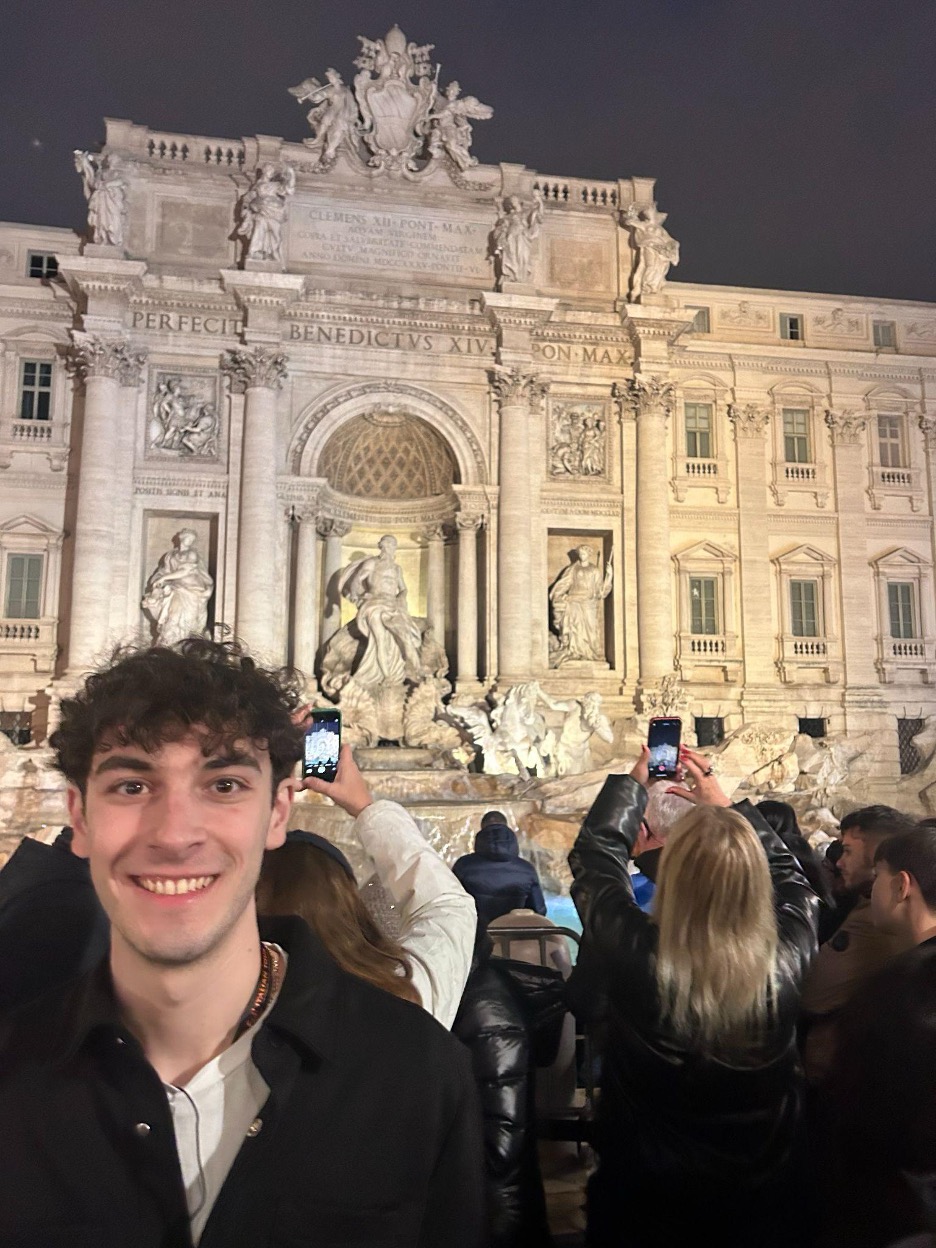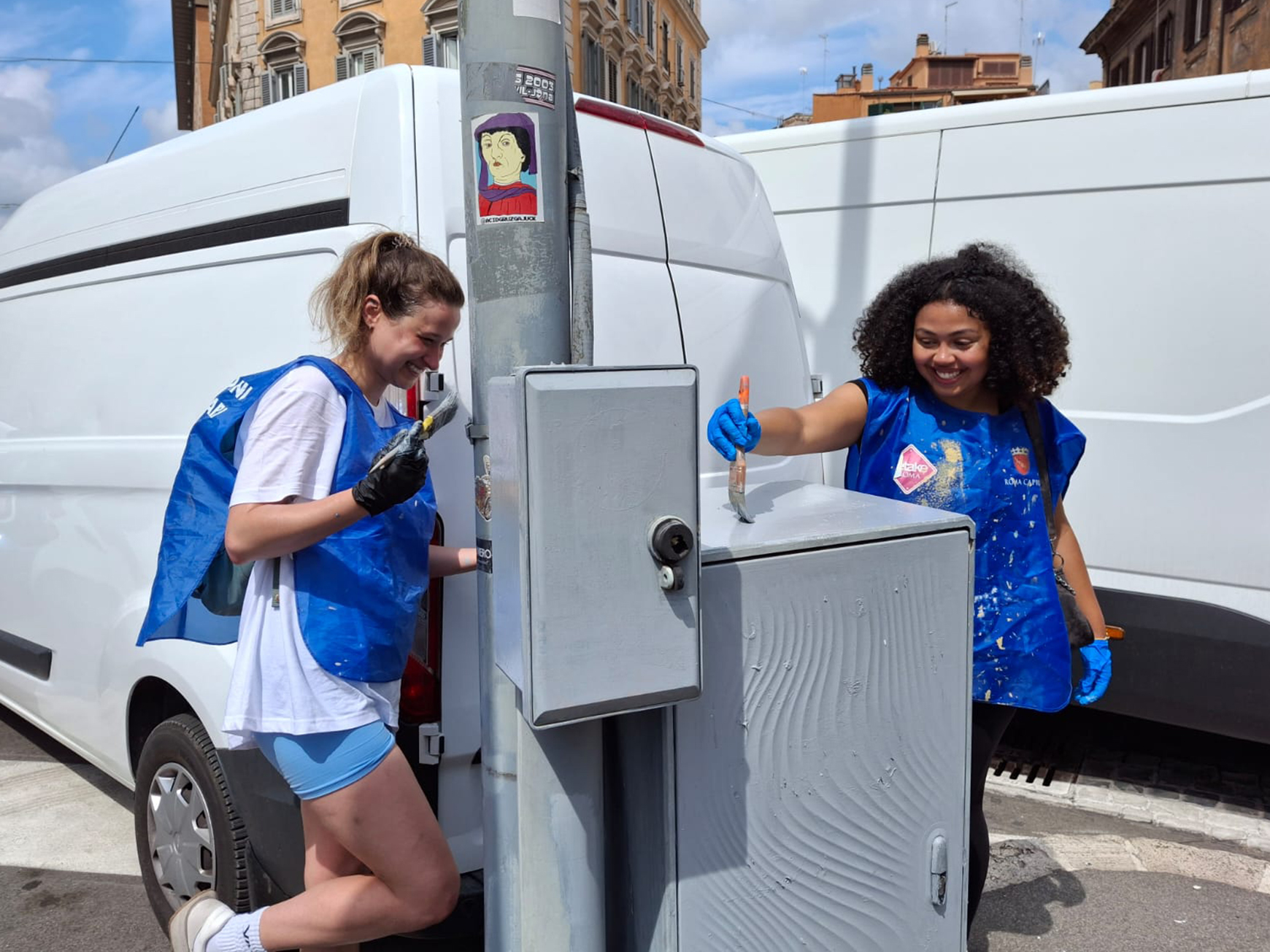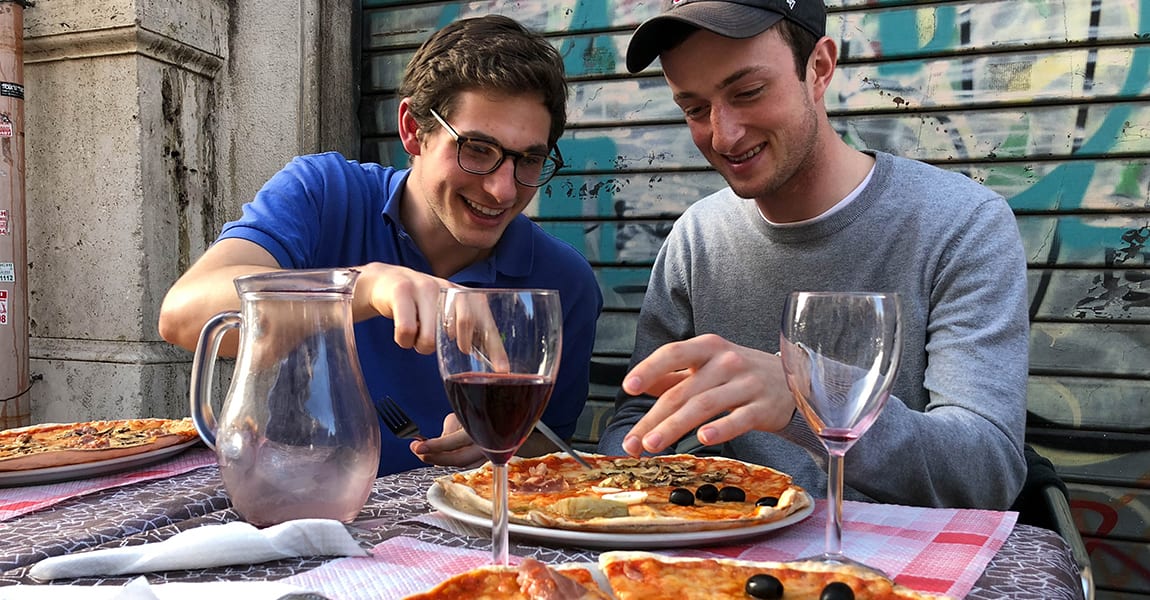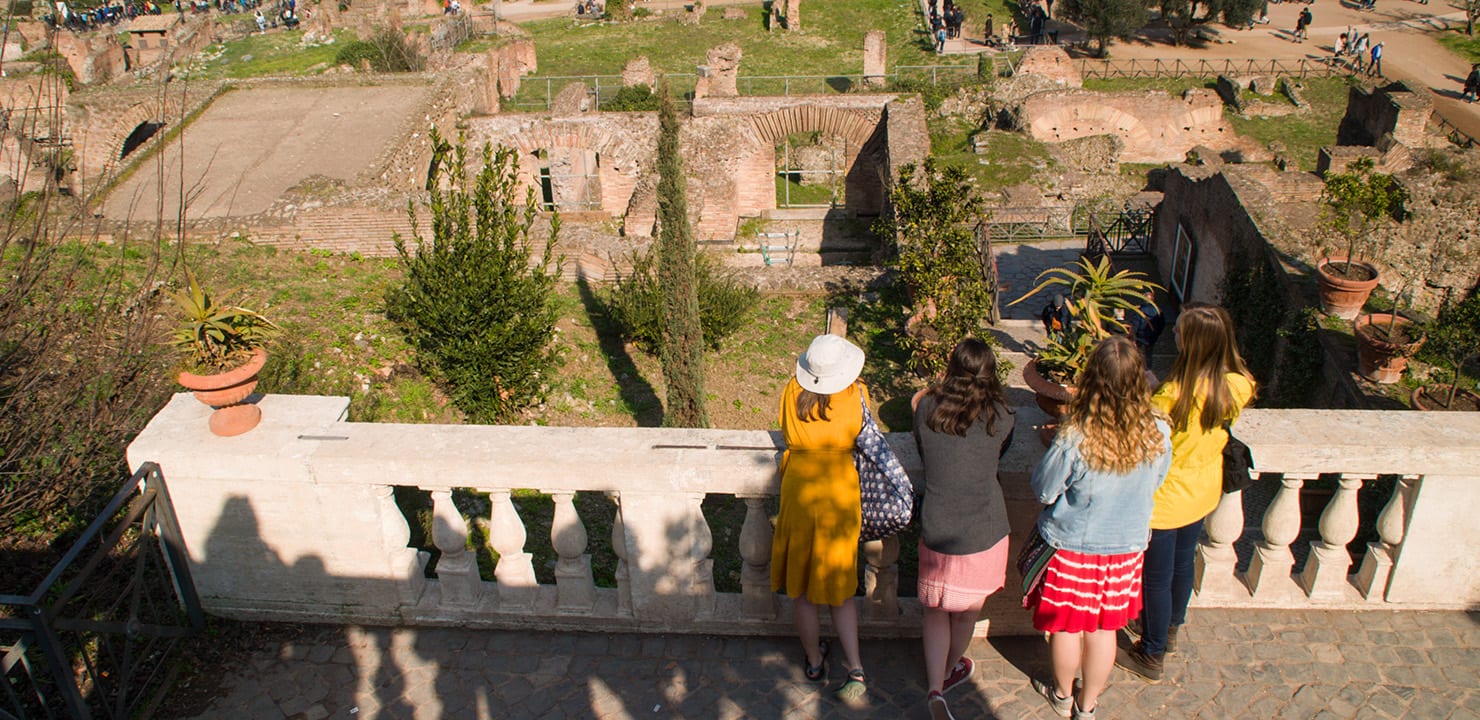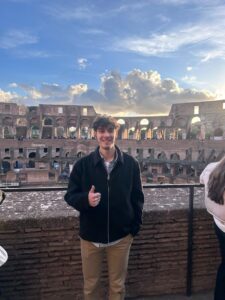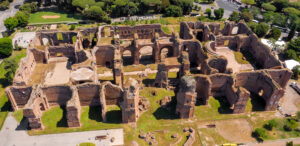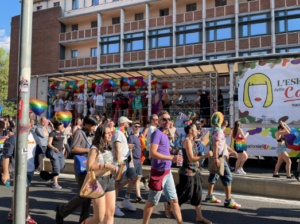Rome, Italy
IFSA Rome Quarter Program: Business


Program Overview
SINK INTO LA DOLCE VITA AS YOU EXPLORE BUSINESS THROUGH A NEW LENS
Rome is people watching from the Spanish Steps. Savoring gelato with a friend after class. And living where centuries-old landmarks like Trajan’s Column and the Trevi Fountain are part of the everyday scenery.
Fall, winter, or spring, this program introduces you to the many treasures in Italy’s capital city—and a more relaxed pace of life. Plus, it’s tailored to align with the quarter-system calendar and credit requirements that can make studying abroad challenging.
Taught by local faculty at our conveniently located IFSA center, academics are ideal for students who are interested in business. You can also take advantage of internship opportunities to gain professional experience and deepen connections with the people of Rome.
IFSA students share apartments in traditional neighborhoods that invite you to live like the locals and simplify getting around. Take advantage of curated IFSA excursions and activities, designed to draw you into Italian culture—and included in your program fee. Possibilities include visits to Pompeii, Capri, and Orvieto, as well as pasta-making lessons and language mixers. Andiamo!
Visit our Scholarships, Grants, and Financial Aid page to learn about IFSA Quarter Program Grants, IFSA First-Generation Scholarships, and more.
Details at a Glance
Application deadline
Minimum GPA
2.00
Credit load
13.5–18 quarter credits
Housing
Apartment/Flat, Single Room Option
Instruction language
English
Language prerequisites
None
Visa required?
Not in most cases. Learn more.
Academics
Students enroll in three or four classes per quarter. Not all classes may be offered in a given term, depending on enrollment.
Business
Foundations of Statistical Inference
The introductory course focuses on statistical inference with an emphasis on business applications. Students will explore descriptive statistics, probability distributions, sampling distributions, and statistical inference for means and proportions using one and two samples. The course also covers linear regression analysis and equips students with the tools to interpret and communicate statistical findings effectively. Emphasis is placed on applying statistical techniques to real-world business problems and using computer-assisted analysis. (4 U.S. quarter credit hours)
Business Ethics
This course delves into the core principles of ethics as they relate to the corporate landscape. Through a blend of theoretical exploration and practical case studies, students will examine the intricate ethical dilemmas faced by businesses and organizations. Emphasis will be placed on understanding the role of ethical leadership in fostering an environment conducive to ethical decision-making within the business realm. (3 U.S. semester credit hours)
Beyond Borders: Local Solutions Driving Global Sustainable Development
This course delves into the United Nations Sustainable Development Goals (UNSDGs) and the pressing global challenges impacting our world today. Through an interdisciplinary approach, students will explore critical topics such as poverty, hunger, inclusive practices, environmental protection, and sustainable living within the context of their study abroad host country. By analyzing local contexts and investigating mitigation efforts, students will gain a nuanced understanding of how these global challenges manifest and how diverse perspectives can be integrated to address them ethically and effectively.
Throughout the course, students will engage in critical evaluations and reflections to develop their personal agency in addressing global problems. They will explore and compare international, national, and local responses to these issues, fostering an informed and ethical approach to sustainable development. The course emphasizes active engagement and ethical considerations, preparing students to contribute meaningfully to the wellbeing of communities worldwide. (3 U.S. semester credit hours)
Business Management
The Business Management course offers students a comprehensive understanding of the fundamentals of managing and leading businesses in today’s competitive global market. Through a blend of theoretical knowledge and practical applications, students will explore key areas such as strategic management, marketing, finance, operations, human resources, and entrepreneurship. The program emphasizes critical thinking, problem-solving, leadership, and decision-making skills essential for business success. Students will engage in real-world case studies, group projects, and internships to develop hands-on experience and industry connections. The course also integrates contemporary issues such as sustainability, digital transformation, and global business trends, preparing graduates to adapt and thrive in a dynamic business environment. Graduates will be well-equipped for careers in management, consultancy, finance, marketing, and entrepreneurship or for pursuing advanced studies in business. This program aims to foster innovative thinkers who can drive growth and innovation in various organizational settings. (3 U.S. semester credit hours)
Ethical Decision-Making
This course invites students to examine a number of ethical issues revolving around economic order and business by understanding the context in which business agents operate. From empirical and normative perspectives, students engage with theory from moral philosophy, organizational behavior, economics and management, with cases that illustrate the ethical issues in the business environment. (3 U.S. semester credit hours)
Forced Migration, Refugees, and Change
More than 60 million people are displaced by war, violence, and environmental destruction today. Using ethnographic approaches, students investigate sociological and political forces behind the current increase of refugees impacting Europe, considering what has been accomplished and what can be done in the future through governments, NGOs, citizens, and researchers to address challenges with forced migration. (3 U.S. semester credit hours)
Intercultural Communication
This course invites students to critically explore intercultural communication through direct engagement with diverse cultural environments. Students explore how culture-general concepts, power dynamics, and societal structures shape communication across borders. Emphasis is placed on developing self-awareness and other-awareness, particularly in relation to cultural group memberships and personal identities. Through immersive learning and reflective practices, students cultivate respect for varied communication styles and cultural perspectives, gaining the skills to interact thoughtfully and effectively across cultural boundaries. The course also highlights the resilience and contributions of marginalized communities, encouraging students to recognize and honor the richness of global diversity in both everyday interactions and broader societal contexts. (3 U.S. quarter credit hours)
International Marketing
Virtually everything we do in our lives is influenced by factors around the world. This class guides students through the global marketing historical developments, the major drivers of influence, the challenges for organisations, and the contributing elements of the marketing spectrum. As organisations grow and develop, the world gets smaller. We see this through the growth of digital/social communication platforms. For organisations and commercial bodies, international/global marketing is both a challenge and a huge opportunity. Students aspiring to work for global companies will learn about the impact and stimulus for international marketing, and the variety of strategic and tactical marketing considerations. Brands such as McDonald’s, Starbucks, Coca-Cola, and BMW have all gone through the global marketing transition and been influenced by the myriad forces of transitioning trade from a home country to an international environment. (3 U.S. semester credit hours)
International Business
Organizational Behavior (OB) is a field of study devoted to understanding, explaining, and ultimately improving the attitudes and behaviors of individuals and groups in organizations. This course focuses on diagnosing individual and small-group behavior and developing skills to improve performance in both entrepreneurial and established ventures. Emphasis is placed on professional skill development and the practical application of theory and research. Concepts of ethics, diversity, and cross-cultural relations are integrated throughout the course. (3 U.S. semester credit hours)
Managing Individual and Team Performance
Organizational Behavior (OB) is a field of study devoted to understanding, explaining, and ultimately improving the attitudes and behaviors of individuals and groups in organizations. This course focuses on diagnosing individual and small-group behavior and developing skills to improve performance in both entrepreneurial and established ventures. Emphasis is placed on professional skill development and the practical application of theory and research. Concepts of ethics, diversity, and cross-cultural relations are integrated throughout the course. (4 U.S. quarter credit hours)
Operations and Supply Chain Management
The introductory course focuses on statistical inference with an emphasis on business applications. Students will explore descriptive statistics, probability distributions, sampling distributions, and statistical inference for means and proportions using one and two samples. The course also covers linear regression analysis and equips students with the tools to interpret and communicate statistical findings effectively. Emphasis is placed on applying statistical techniques to real-world business problems and using computer-assisted analysis. (3 U.S. semester credit hours)
Service Operations Management
This course is designed to explore, challenge and refine the principles of service operations management with a special focus on hospitality and tourism operations. With 58 million visitors to Italy annually (Italy is the fifth most visited country in the world), Rome is an ideal site for applying course objectives. The foundation is built upon our understanding that service excellence is achieved through strategy, systems and staff.
By the end of this course, students should learn how organizations manage and improve their service operations. The course will analyze service delivered to customers inside an organization (such as staff in other functions) or the service provided by public sector organizations, voluntary organizations, professional services, business to business services, retailers, and tourism and hospitality. (3 U.S. semester credit hours)
Principles of Marketing
This course introduces students to the foundational concepts, terminology, and practices of marketing. Designed for business studies, it explores the dynamic relationships between customers, products, and companies within competitive markets. Through lectures, discussions, field visits, and case studies, students will gain insights into the unique business culture of Rome, and learn how marketing strategies are developed and applied to create value and drive business success in ways that reflect both local and global perspectives. (4 U.S. quarter credit hours)
Strategic Management
The Strategic Management course provides students with the tools and frameworks needed to make high-level strategic decisions in a competitive business environment. It explores key concepts such as competitive advantage, industry analysis, corporate strategy, and the strategic planning process. Students will learn how to assess both internal and external factors that affect organizational success and apply analytical tools like SWOT, PESTLE, and Porter’s Five Forces to real-world scenarios. The course emphasizes critical thinking, problem-solving, and decision-making skills, preparing students to develop and implement effective strategies that drive long-term success. Through case studies, group projects, and simulations, students gain practical insights into strategic challenges faced by businesses in a globalized world. The course also covers emerging trends in innovation, sustainability, and digital transformation, equipping graduates to navigate dynamic markets and create value in their organizations. Ideal for future leaders in business, consulting, or entrepreneurship. (3 U.S. semester credit hours)
Art & Architecture
Museums and Society in Rome
This course provides a comprehensive exploration of museum studies, using Rome’s iconic collections as a backdrop to analyze the evolution, function, and contemporary challenges museums are facing today. Through critical inquiry, students will engage with key issues such as curation, exhibition design, audience interaction, and ethical dilemmas in the museum world. The course emphasizes the role of museums as dynamic cultural institutions, shaping public memory and identity. With a focus on both theoretical frameworks and practical applications, students will examine how museums navigate issues like repatriation, inclusion, and the impact of technology. Visits to pivotal institutions and guest lectures from museum professionals will enrich students’ understanding of the ever-evolving landscape of museum practice. (3 U.S. semester credit hours)
Italian Art, Power, and Influence
Art and culture reflect the society they stem from, and at the same time they can be vehicle for political messages and even play a role in international relations. This course will explore how the “soft power” of art — including literature, cinema, architecture, and visual arts in general — can be leveraged by individuals, groups, or governments as they promote their ideas and values for political gain and influence. Students visit famous monuments, museums, and architectural sites that showcase more than 2,000 years of Italian history through its great artists and leaders. (3 U.S. semester credit hours)
Food, Culture, and Identity in Italy
This course explores the complex relationships between Italian cuisine, history, and society, with a special focus on Rome as a case study of national food traditions. Through an interdisciplinary lens, students will examine the evolution of Italian food culture across regions, the impact of globalization, and the economic significance of the “Italian” brand in global food markets. The course investigates how the food industry shapes narratives around tradition and innovation in Italian cuisine. Students will engage with local markets, artisan producers, and historical culinary sites to gain firsthand insight into the cultural and economic significance of food in Italy. Assignments include reflective tastings, comparative food analyses, and collaborative projects that critically evaluate the intersection of food, heritage, economics, and modern consumption. (3 U.S. semester credit hours)
DIRECTED RESEARCH
Engage in individualized field research with faculty experts on a contemporary issue of interest. Regular meetings with faculty will assist in the formation and execution of research plans, and they will guide you on how to thoughtfully and critically integrate academic research with experiential learning. You will sharpen your written and oral communication skills through the development of articulate and comprehensive research that is respectful to the sensitivities of the local culture.
If you chose to research live human subjects, live animals or another topic that is deemed by IFSA to be required to be reviewed by the Institutional Research Board (IRB) at your home institution, then you will have to file your project with your home institution’s IRB board and submit your result to IFSA. Your IFSA Enrollment Counselor will review your application materials to help determine if you must file with IRB.
For more detailed information and examples of previous student placements, contact your IFSA Enrollment Counselor.
INTERNSHIPS
IFSA internships include real-world work experience, along with developing intercultural skills and experiences that are key to personal, academic, and professional success. Expect to devote a total of 120 hours working with your host organization, with supervision from your seminar instructor, coordinated by on-site IFSA team members. In addition, interns complete the International Internship Seminar for 3 U.S. semester credit hours. Internships are not remunerated.
Students have interned at galleries and museums, business incubators, development agencies, religiously affiliated non-profits, and human rights advocacy groups in Rome.
Your goals are carefully considered, tailoring the placement process to ensure the best possible fit. Keep in mind that final placements depend on your skills, prior experience, and availability. Although every effort is made to match your placement with your preferred field or area of business, it can’t be guaranteed. Most internships are conducted in English. If you have had at least four semesters of Italian language instruction, you can ask your IFSA Enrollment Counselor about opportunities to conduct your placement in Italian.
Application. After you submit your application, resume, and IFSA Internship Interest Form, an IFSA Enrollment Counselor and an on-site IFSA Team member will work with you to identify your professional strengths, review your goals, and refine your internship interests to establish a match. From there, you’ll have an interview with your potential internship host. You will be provided with tips and resources to prepare for your interview.
Sample Placements. The following are examples of internships IFSA students have recently completed. Placement options vary from term to term.
- Organization: This is a day center for refugees and asylum seekers. It offers services ranging from basic supplies, to legal and social counseling, employment support, language and skills courses, for nearly 150 people every day.
Subject Areas: Social Studies, Education, Communications, Political Science
Potential Projects: Interns will help with front desk operations, office management, intercultural mediation, as well as with promotional initiatives and event planning. - Organization: This Rome-based, independent, English-language, online magazine covers everything Italy-related, offering news and opinion about politics, economy, culture, and sports.
Subject Areas: Communications, Journalism, Marketing
Potential Projects: You will help with content creation for the magazine and promotion. - Organization: This English-language event and lifestyle magazine is targeted to tourists and expats visiting or living in Rome. It includes a daily listing of the latest and most diverse cultural and lifestyle events in and around Rome.
Subject Areas: Communications, Journalism, Marketing
Potential Projects: You will help with content creation for the magazine and promotion. You can also be involved in the creation of a new Florence branch of the magazine. - Organization: This is an historic Rome-based association, one of the first in Italy, that offers support to the LGBTQ+ community and organizes cultural events and initiatives, including the big annual Pride event.
Subject Areas: Communications, Cultural Studies, Gender Studies, Politics
Potential Projects: You will help with the organization of cultural events and contribute to the social media presence of the association. - Organization: This is a small private museum in the very heart of the historic center, focused on interactive reproductions of inventions and machines designed by Leonardo da Vinci.
Subject Areas: Communications, Museum Studies, Art History, Marketing
Potential Projects: Interns will help with front desk operations, English-led tours, as well as with promotional initiatives and social media campaigns.
New country, new way of learning!
Here’s what to expect at IFSA Study in Rome:
- More emphasis on independent learning. More self-directed learning outside of class.
- Locate the syllabi for IFSA classes on our program page to understand assignments and class requirements.
- Grade inflation and curving are uncommon; fewer students get exceptional grades.
- Strong focus on critical analysis with supporting resources documented.
- Students cannot audit courses.
APPLICATION REQUIREMENTS
Eligibility
- You must be at least 18 years of age. Students under 18 may be accepted on a case-by-case basis.
- You must be currently attending or recently graduated from a U.S. or Canadian community college, technical college, two-year college, four-year college, or four-year university.
- You must have completed at least one (1) full-time quarter of study at your home institution before the beginning of the term.
- If you would like to pursue the option to take a class at LUISS a 2.7 GPA is required.
Recommendation Letter
Not required. A directed research or internship site may request a reference letter before placement is finalized.
TRANSCRIPT
Upon completion of your program, IFSA will send an official Butler University transcript to your home university with your coursework converted to the U.S. semester credit hour system. You will also have access to an unofficial transcript in your IFSA Student Portal. The transcript reflects classes taken, credits attempted, and grades earned during your term abroad. This service is included in your study abroad program at no additional cost. See our Transcripts page for more information.
Excursions
Activities and excursions are designed to pull you into the communities you visit and encourage cultural connections of every kind. There’s no extra fee to participate in these optional outings—everything is included in your program fee.
Below are a selection of activities and excursions from previous terms; options may vary for your program. Due to the seasonal nature of many of program activities, we cannot guarantee a specific activity or excursion will be available in a given term or program.
Activities
- Colosseum, Roman Forum, and Palatino Hill Tour: During orientation, seize this chance to get to know Rome by exploring some of the most iconic monuments in world history and the heart of the city.
- Sustainability Day with Legambiente: Raise awareness of the importance of protecting the environment by volunteering with this historic Italian association at a community garden in the Garbatella neighborhood.
- Traditional Roman Cooking Class: Enjoy Roman cuisine and learn the secrets of authentic homemade pasta during this cooking class and dinner.
- Cultural Exchange Aperitivo: Whether you’re perfecting your Italian language skills or just starting out, join local Italian university students at a local coffee bar to practice, compare cultural notes, and forge new friendships.
- Bay of Naples Trip: Your two-day excursion begins in Pompeii, where you’ll explore the archaeological remains, buried in the ash of Mount Vesuvius in 79 A.D. Next, discover the legendary beauty of the island of Capri. Finally, get to know historic Naples, a seaside city brimming with architectural treasures—and famous for introducing the world to pizza.
- Orvieto Day Trip: Enjoy a guided tour of Orvieto, an astonishingly preserved medieval town, including a visit to its impressive cathedral and to the famous St. Patrick’s Well.
Housing and Meals
Housing
Apartment/Flat, Single Room OptionMeals
Self-cateringDetails
Rome students typically live in fully-furnished apartments shared by four to six students in Rome’s historic center, Prati, or Trastevere neighborhoods. Apartments vary but are generally in updated historic buildings in neighborhoods with plenty of local charm, an easy 30- to 45-minute commute from the IFSA Program Center, either on foot or using public transit.
Your apartment mates could include other study abroad students, as well as students from Italy or other countries, and could be mixed gender. Most apartments have two or more bathrooms. Bedrooms are typically shared by two IFSA, same gender students. In a few cases, depending on the specific apartment layout, triple, or single rooms are possible. In some cases, there’s an option to request a single, private room by paying an a supplemental fee. Students are responsible for meals.
Sample housing
Explore Via Cola di Rienzo to see what your Rome home might be like:
- Location: The Prati district, close to Rome’s historic city center.
- Commute: A six-minute walk to the IFSA Program Center.
- Living space: Apartments for four to six students in older, historic buildings. Students share bedrooms with two, same gender students per room. Bedrooms include single beds and storage. All residents share the living space, kitchen, eating area, and bathroom(s). Sometimes two students share one desk. Complete bedding and towels provided. Kitchens are equipped with oven, refrigerator, and basic dishes and kitchenware.
- Meals: No meal plan. Students prepare or purchase meals, and often tell us cooking together is a fun, social part of the day. Plus, we’ll share pro grocery shopping tips when you arrive.
- Other details: Wi-Fi included. Laundry washing machine and drying rack. Vacuum cleaner. Iron and ironing board. Fans. Air conditioning is common but not guaranteed. Weekly cleaning service of shared spaces is often included.
- Nearby: Cafes, markets, shopping, public transportation. Vatican City. Castel Sant’Angelo. Tiber River. Piazza del Popolo. Villa Borghese. Spanish Steps. Piazza Navona and the Fountain of the Four Rivers.
Dates and Fees
Get Started

Eleni Katsarelas
Senior Enrollment Counselor
